

The Unique Energy of Every Myers-Briggs® Personality Type – Psychology Junkie. The 8 Unspoken Rules That Every INTJ Follows Without Even Meaning To. Zuckerberg.
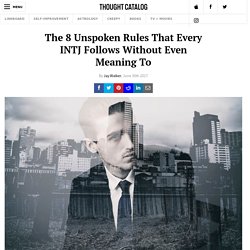
Tesla. Newton. They are your professors, your politicians, your military leaders, your CEOs. They are the all-serious, all-silent, all-awkward masterminds of the world. I’m talking about, you guessed it – the INTJ. INTJs have strong principles and many live spartan lifestyles most people couldn’t handle. It is likely there are people out there who want to be an INTJ, or at least emulate the blueprint that makes many of them so successful. INTJs are reliable and can be counted on to follow through on their commitments. 10 Things You'll Relate to If You're an INTJ. The Unique Mental Powers of the INFJ, INTJ, ENFJ and ENTJ Personality Types – Psychology Junkie. Here's Why INFJs and INTJs Seem "Intense" One of the things that repeatedly comes up in the personality community is the “INFJ stare” or the “INTJ death glare”, etc,.

While I’m somewhat skeptical of these “stares”, I have to admit that INJ types are notoriously known for being intense. Why? Where does this intensity come from? How can it be spotted in real life? Let’s take a look! INFJs and INTJs have a lot in common, at least according to their mental wiring. What is Introverted Intuition? Introverted Intuition is a perceiving (information-gathering) function that focuses on interpreting abstract meanings, connections, and finding contextual information. Why Does Intuition Make INFJs and INTJs Intense? INJ personalities are often called the ultimate big picture thinkers. INJs are the most happy when they have a sense of purpose and long-term direction. In the mind of the INJ, experiences with less depth are often seen as interruptions to the meaning they are trying desperately to pursue. The Online Myths About Each Myers-Briggs® Personality Type.
Due to the prevalence of poorly-created personality tests online, there are an abundance of mistyped people who then go out into the world and perpetuate inaccurate information about personality.
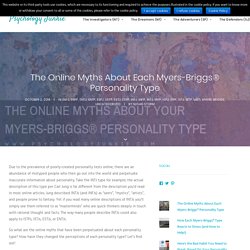
Take the INTJ type for example; the actual description of this type per Carl Jung is far different from the description you’d read in most online articles. Jung described INTJs (and INFJs) as “seers”, “mystics”, “artists”, and people prone to fantasy. Yet if you read many online descriptions of INTJs you’ll simply see them referred to as “masterminds” who are quick thinkers deeply in touch with rational thought and facts. 10 Things INTJs Need In A Friendship – Like An Anchor. Ever wonder how to be friends with an INTJ?

This personality type has a reputation for being intelligent and aloof loaners, but like many stereotypes this isn’t really all that accurate. INTJs put a high value on friendships and they can make wonderful friends. I’m going to assume that since you’re reading this article you either want to make friends with an INTJ or you want to be a better friend to the INTJs in your life. So without further ado, here are 10 things INTJs need in a friendship.
Looking for a test that can help you discover your personality type? INTJs are fiercely loyal once they care about you. Here's What Your Core Values Are, Based On Your Personality Type. Here's Your Secret Strength, Based on Your Personality Type. Here's How You Solve Problems, Based on Your Personality Type. Ira Glass: Come Sunday. What Each Myers-Briggs® Personality Type REALLY Wants to Talk About. Contrary to popular belief, most people (extrovert, introverts, sensors, intuitives) don’t really like small talk that much.
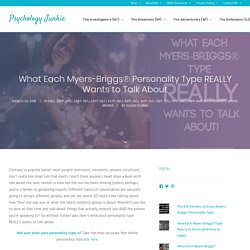
I don’t think anyone’s heart skips a beat with talk about the next rainfall or how hot the sun has been shining (unless, perhaps, you’re a farmer or gardening expert). Different topics of conversation are naturally going to attract different people, and yet we spend SO much time talking about how “fine” our day was or what the latest celebrity gossip is about. Wouldn’t you like to save all that time and talk about things that actually interest you AND the person you’re speaking to? Why INFJ, INFP, INTJ, & INTP Types Struggle in Modern Life (Part 2) By Elaine Schallock I.
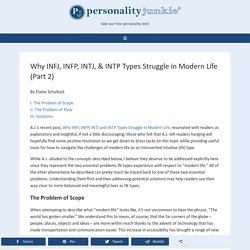
The Problem of ScopeII. The Problem of PaceIII. Solutions A.J.’s recent post, Why INFJ, INFP, INTJ and INTP Types Struggle in Modern Life, resonated with readers as explanatory and insightful, if not a little discouraging; those who felt that A.J. left readers hanging will hopefully find some positive resolution as we get down to brass tacks on this topic while providing useful tools for how to navigate the challenges of modern life as an Introverted Intuitive (IN) type. While A.J. alluded to the concepts described below, I believe they deserve to be addressed explicitly here since they represent the two essential problems IN types experience with respect to “modern life.”
The Problem of Scope When attempting to describe what “modern life” looks like, it’s not uncommon to hear the phrase, “The world has gotten smaller.” There is no question that the scope of ideas and things available to us in the outside world has increased exponentially. Why INFJ, INFP, INTJ, & INTP Types Struggle in Modern Life. By Dr.
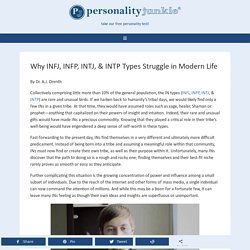
A.J. Drenth Collectively comprising little more than 10% of the general population, the IN types (INFJ, INFP, INTJ, & INTP) are rare and unusual birds. If we harken back to humanity’s tribal days, we would likely find only a few INs in a given tribe. At that time, they would have assumed roles such as sage, healer, Shaman or prophet—anything that capitalized on their powers of insight and intuition. Fast-forwarding to the present day, INs find themselves in a very different and ultimately more difficult predicament. Further complicating this situation is the growing concentration of power and influence among a small subset of individuals.
Put simply, the path to a meaningful societal role for IN types is far less straightforward than it once was. The Weak Spot of Every Myers-Briggs® Personality Type (and How to Strengthen It!) - Psychology Junkie. Each of us has weak spots, and while some of these probably have nothing to do with personality type, some probably do!
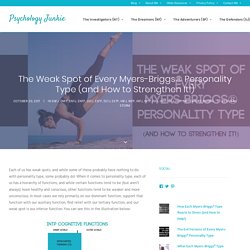
When it comes to personality type, each of us has a hierarchy of functions, and while certain functions tend to be (but aren’t always) more healthy and conscious, other functions tend to be weaker and more unconscious. In most cases we rely primarily on our dominant function, support that function with our auxiliary function, find relief with our tertiary function, and our weak spot is our inferior function. You can see this in the illustration below: Usually at least one of our weaknesses stems from unhealthy development or suppression of the inferior function.
If we spend all our time ignoring input from our inferior function we can overwork our dominant function and fall “into the grip” of our inferior function. 12 type secrets of the INTJ personality - Introvert, Dear. Comprising only 2 percent of the adult U.
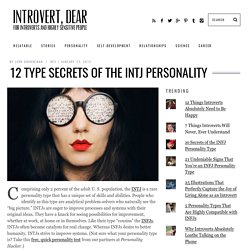
S. population, the INTJ is a rare personality type that has a unique set of skills and abilities. People who identify as this type are analytical problem-solvers who naturally see the “big picture.” INTJs are eager to improve processes and systems with their original ideas. They have a knack for seeing possibilities for improvement, whether at work, at home or in themselves. Like their type “cousins” the INFJs, INTJs often become catalysts for real change.